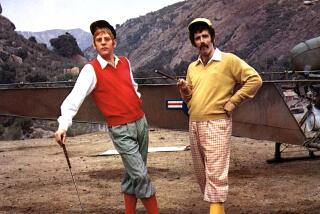TV REVIEW : ‘Waldo Salt’ Gets His His Due
- Share via
Cynical screenwriters may just believe hell is finally freezing over when they watch one of their own get the kind of lavish due usually only afforded directors in “Waldo Salt: A Screenwriter’s Journey” (at 9 tonight on KCET Channel 28 and KPBS Channel 15). The highly watchable hourlong profile, nominated for last year’s best documentary Oscar, is making its TV debut as a PBS “American Masters” special.
It’s tempting to want to laud this special for concentrating at last on one of the folks who puts the words in actors’ mouths, except that the late Salt makes it clear here that he was less concerned with the perfection of dialogue than he was with putting compelling imagery on the page for the director to shoot. The cameras even allow a close-up of a page from Salt’s brilliant, Oscar-winning script for “Midnight Cowboy” to show that, yes, somebody wrote all those quick-cut flashback montages. For hardcore proponents of the directorial auteur theory, it might come as a rude awakening.
Even more potentially provocative is the section that focuses on the Hollywood blacklist of the late ‘40s and ‘50s, when Salt--a card-carrying member of the Communist Party for a time--refused to name names and was banished from credited film work for 15 years.
It’s probably the least satisfying part here; the friends and associates interviewed talk about Salt’s idealism and how it crumbled when he learned of the Stalinist horrors in Russia, but Salt himself apparently didn’t discourse much on the subject on camera before his 1987 death, unfortunately.
What’s even more fascinating, for writers or anyone with creative ideals, are Salt’s post-blacklist years, in which he threw himself back into screenwriting--bad writing, turning out admittedly awful script after script. Eventually he forced himself to a decision to slow down his work pace, buckle up his artistry and not be a hack, resulting in both his Oscars coming toward the end of his career (the other one being for “Coming Home”). This lesson, illustrated with well-picked classic film clips, ought to be required viewing for everyone in Hollywood.
More to Read
The complete guide to home viewing
Get Screen Gab for everything about the TV shows and streaming movies everyone’s talking about.
You may occasionally receive promotional content from the Los Angeles Times.






